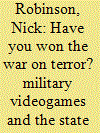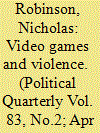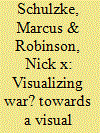| Srl | Item |
| 1 |
ID:
141198


|
|
|
|
|
| Summary/Abstract |
Videogames matter and they matter for international politics. With popular culture increasingly acknowledged as a valuable site for opening up new ways of interrogating theory, this article argues that important insights for the critical understanding of American exceptionalism can be developed through the study of military videogames. At one level, military videogames illustrate a number of prominent themes within American exceptionalism: they offer the perception that a threatening and hostile environment confronts the USA, thus situating America as an innocent victim, justified in using force in response; they allow exploration of the link between American exceptionalism and debates on the competence of political leadership, and they open up space to analyse the temporal dimension of international relations. Yet videogames also help expose the foundations (what Weber terms ‘the myths’) upon which American exceptionalism is based, here shown to be centred on the importance of the military industrial complex as a source of exceptionalism.
|
|
|
|
|
|
|
|
|
|
|
|
|
|
|
|
| 2 |
ID:
112093


|
|
|
|
|
| Publication |
2012.
|
| Summary/Abstract |
This article explores the way that politicians and legislators have responded to concerns over the link between videogames and violence in the UK, particularly in terms of ensuring that inappropriate content remains inaccessible to minors. It explores the recent changes to the regulatory framework centred on videogames, arguing that the move to a universal statutory framework has implications that are more symbolic than real-policy is still underpinned by the 'precautionary principle' and the framework remains equally likely to be undermined by the actions of parents who ignore ratings and purchase age-inappropriate games for their children. Perhaps predictably, the political establishment has been unwilling to engage with this parental neglect, attributing it to 'ignorance' and 'the need for a simplification of the ratings system'. This paper argues that such responses are essentially a smokescreen used by governments which are understandably unwilling to take prosecutions into the home and retail space.
|
|
|
|
|
|
|
|
|
|
|
|
|
|
|
|
| 3 |
ID:
150503


|
|
|
|
|
| Summary/Abstract |
Political scientists are increasingly engaged with the importance of the “visual turn,” asking questions about how we understand what we see and the social and political consequences of that seeing. One of the greatest challenges facing researchers is developing methods that can help us understand visual politics. Much of the literature has fallen into the familiar qualitative versus quantitative methodological binary, with a strong bias in favor of the former, and has consequently been unable to realize the advantages of mixed-methods research. We advance the study of visual politics as well as the literature on bridging the quantitative versus qualitative divide by showing that it is possible to generate quantitative data that is rooted in, and amenable to, qualitative research on visual phenomena. Our approach to conducting mixed-methods research is an alternative to the more common strategy of seeing various research methods as an assortment of tools, as it is directed at developing an organic relationship between qualitative and quantitative methods. We demonstrate the effectiveness of this strategy for research on visual politics by discussing our own efforts to create a dataset for quantifying visual signifiers of militarism.
|
|
|
|
|
|
|
|
|
|
|
|
|
|
|
|